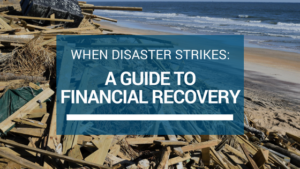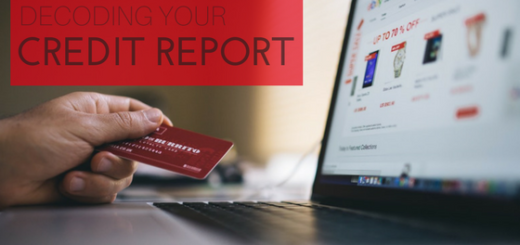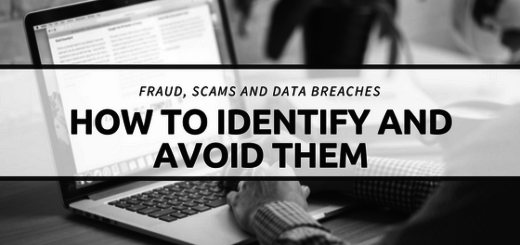When Disaster Strikes: A Guide to Financial Recovery
 Whether it’s hurricanes, tornadoes, wildfires or anything in between, we’re all likely to experience a natural disaster at some point. In the past few months alone, millions of people have experienced devastation from hurricanes Harvey, Irma, Maria and Nate, and many others have faced horrible wildfires. Even if you’re one of the lucky ones who was unaffected, it’s still important to have a plan in place. Recovering from a disaster takes a lot of time, and unfortunately, a lot of money. Issues you may encounter include being unable to pay your bills, finding temporary housing and dealing with insurance. Here’s our guide for managing your finances after a disaster strikes.
Whether it’s hurricanes, tornadoes, wildfires or anything in between, we’re all likely to experience a natural disaster at some point. In the past few months alone, millions of people have experienced devastation from hurricanes Harvey, Irma, Maria and Nate, and many others have faced horrible wildfires. Even if you’re one of the lucky ones who was unaffected, it’s still important to have a plan in place. Recovering from a disaster takes a lot of time, and unfortunately, a lot of money. Issues you may encounter include being unable to pay your bills, finding temporary housing and dealing with insurance. Here’s our guide for managing your finances after a disaster strikes.
What to do in advance
Know what your risks are. Think about where you are and the events that are most likely to occur there (i.e.: hurricanes, floods, tornadoes, fires). If you’re unsure of what risks are in your area, contact your local emergency management agency. Then, create a plan. Make sure your home is equipped with fire insurance, flood insurance and anything else you may need. Try to take pictures of your home before the disaster if possible. If you can, try to create an emergency fund in case disaster does strike. Another good tip is to have all the documents you need in one place. That way, if you must evacuate you can grab what you need, then get to safety.
What to do during a disaster
It should go without saying, but safety comes first. Once you’re safe and out of harm’s way, there are a few things you can do to prepare for what comes next. First, set your bills to auto-pay. You’ll have a lot going on and a lot on your mind—remembering what you owe and when shouldn’t be one of them. Do an audit of what you have financially. How much is in your emergency savings? What income do you have coming in? Are there any regularly occurring expenses you can suspend while you get back on your feet? If you can, have cash on hand to cover basic needs in case banks go offline, electronic systems fail, or ATM’s run out of money. This is also a good time to familiarize yourself with your insurance policies.
What to do after the disaster
Once the danger has passed, the real work begins. Take pictures of all the damage you’ve sustained. Notify your insurers, including homeowner’s, flood, renter’s, automobile and personal disability. Then, you need to notify your employer to tell them what’s happened and discuss time off. If your employer has also been affected, call you state’s unemployment insurance office to ask about your eligibility for unemployment benefits. Next, you’ll want to determine what your other needs are beyond housing. The Federal Emergency Management Agency (FEMA) can offer financial assistance for necessary expenses or other needs unrelated to housing. DisasterAssistance.gov can also help with expenses such as medical needs, child care or transportation.
Another good idea during this time is to contact your creditors and explain that paying your bill may take some extra time. Most reputable banks and lenders have a hardship or disaster plan they can add to your account to allow you to put off payments without negatively impacting your credit report.
Most of all, it’s important to stay safe. The most important thing during this time is to protect yourself and your family. It may be difficult at times, but you, your family and your finances will greatly benefit from you remaining calm and collected during this tough time. As always, your New Credit America team is always here to help.


